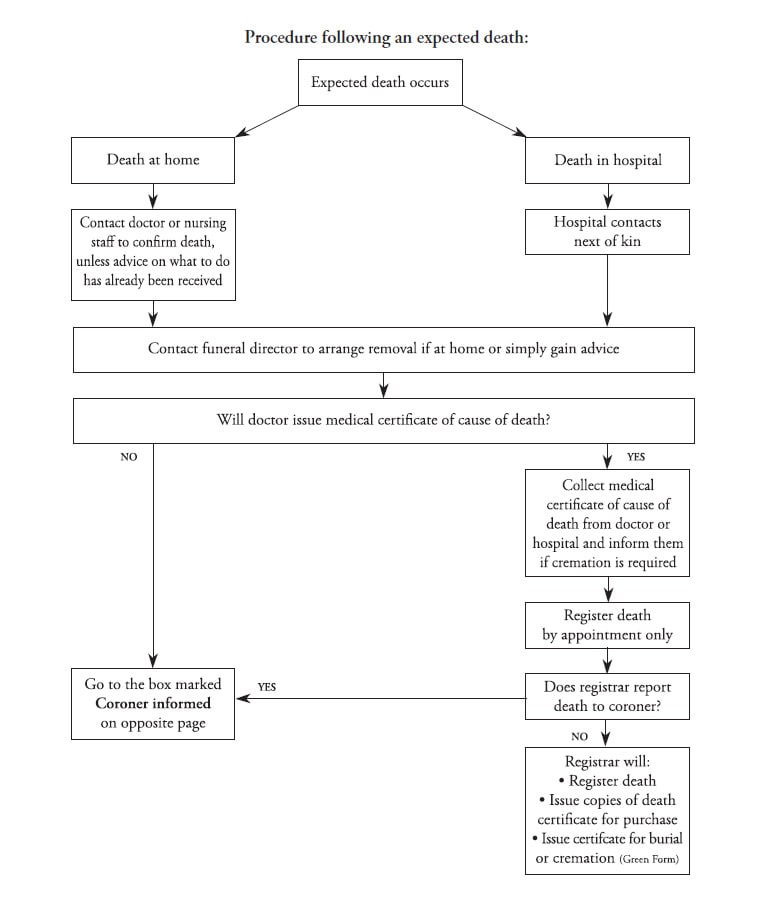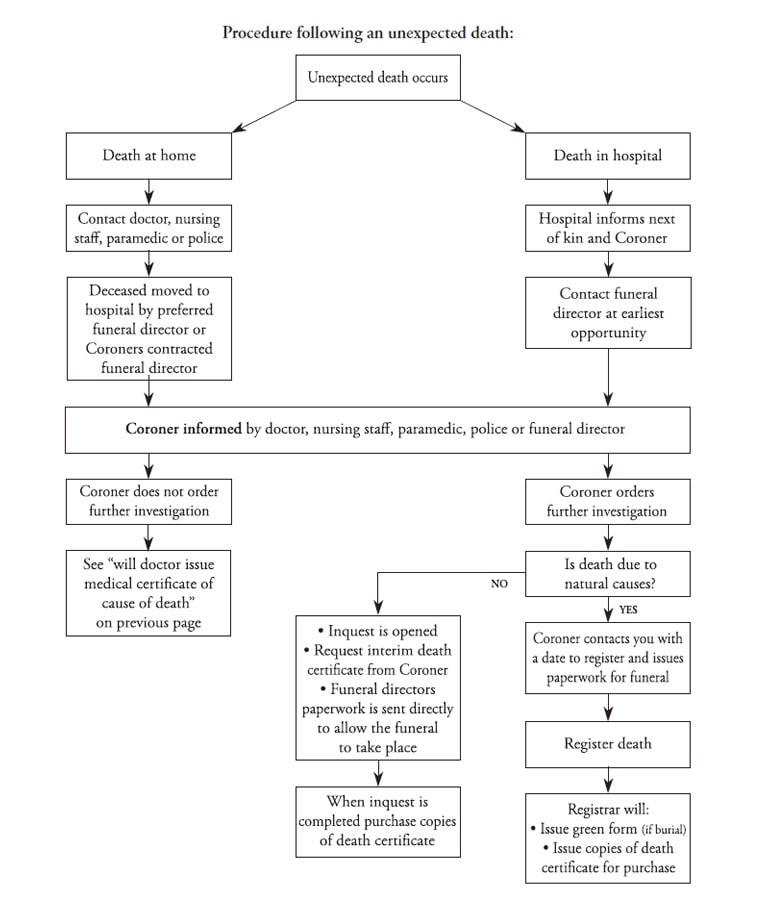Arranging a Funeral ~ First Steps
What to do when someone dies
It’s one of the most traumatic experiences in a person's life when a loved one dies, and the process for those left behind can be daunting.
We are here to support you through the process of arranging a funeral and explain every step so you understand your loved one is given the care, and funeral they deserve.
Whether someone dies at home, in a nursing home or in the hospital we recommend you contact us immediately and we will guide you through the funeral process.
When you’re ready you can either call into one of our offices in Coventry or Bedworth, or, if you prefer, an experienced Funeral Director will make an appointment to visit you, so the funeral arrangements can be made in the comfort of your own home.
We are here to support you through the process of arranging a funeral and explain every step so you understand your loved one is given the care, and funeral they deserve.
Whether someone dies at home, in a nursing home or in the hospital we recommend you contact us immediately and we will guide you through the funeral process.
When you’re ready you can either call into one of our offices in Coventry or Bedworth, or, if you prefer, an experienced Funeral Director will make an appointment to visit you, so the funeral arrangements can be made in the comfort of your own home.
When a death occurs at home
The first step to take when a death occurs at home is to contact the deceased’s own G.P - if the doctor is not available you can contact the emergency doctor.
A doctor will then come to your home and certify that a death has occurred and will if able, issue a medical certificate - it’s most likely that you will need to collect the certificate from the Doctor’s Surgery. This certificate is then required by the Registrar to register the death.
Once the doctor has attended and the death has been certified, please contact us where one of our experienced team will guide you through the next step.
With your permission, our staff will attend your home and arrange for the deceased to be taken to one of our private chapels of rest.
Please note if a death occurs at a nursing or residential home the above procedure will have likely already been carried out, with your permission, by the Matron or Warden.
They will then contact you and advise you where to collect the medical certificate.
A doctor will then come to your home and certify that a death has occurred and will if able, issue a medical certificate - it’s most likely that you will need to collect the certificate from the Doctor’s Surgery. This certificate is then required by the Registrar to register the death.
Once the doctor has attended and the death has been certified, please contact us where one of our experienced team will guide you through the next step.
With your permission, our staff will attend your home and arrange for the deceased to be taken to one of our private chapels of rest.
Please note if a death occurs at a nursing or residential home the above procedure will have likely already been carried out, with your permission, by the Matron or Warden.
They will then contact you and advise you where to collect the medical certificate.
When a death occurs in the hospital
If a death occurs in the hospital, the family will be contacted and the deceased will be taken to the hospital mortuary until you have made funeral arrangements and registered the death.
If cremation is required, the deceased will remain in the hospital mortuary until Doctors have signed the necessary papers, which allow a cremation to take place.
The hospital will arrange for the nearest relative, if possible, to collect a medical certificate from the bereavement office and the hospital. This will be in a sealed envelope addressed to the Registrar stating the cause of death.
This certificate is required by the Registrar, together with the deceased’s medical card (where possible), to register the death.
The image below explains the procedure following an expected death either at home or in the hospital.
If cremation is required, the deceased will remain in the hospital mortuary until Doctors have signed the necessary papers, which allow a cremation to take place.
The hospital will arrange for the nearest relative, if possible, to collect a medical certificate from the bereavement office and the hospital. This will be in a sealed envelope addressed to the Registrar stating the cause of death.
This certificate is required by the Registrar, together with the deceased’s medical card (where possible), to register the death.
The image below explains the procedure following an expected death either at home or in the hospital.

When a death occurs suddenly
When a death is sudden or unexpected you should contact the deceased’s doctor. If the doctor is unable to state the exact cause of death or issue a medical certificate, they will report the death to the Coroner’s Office.
The local police may then need to take statements about the deceased from you and any other witnesses. These statements will be given to the Coroner.
The deceased will then be transported to the Coroner’s Mortuary where a post-mortem examination will be held to establish the exact cause of death.
Once this has been completed by the coroner they will issue a medical certificate which you will be able to collect.
Please contact us where we will explain the next steps and guide you through the process for arranging to bring your loved one into one of our private chapels of rest.
The image below explains the procedure following an unexpected death either at home or in the hospital.
The local police may then need to take statements about the deceased from you and any other witnesses. These statements will be given to the Coroner.
The deceased will then be transported to the Coroner’s Mortuary where a post-mortem examination will be held to establish the exact cause of death.
Once this has been completed by the coroner they will issue a medical certificate which you will be able to collect.
Please contact us where we will explain the next steps and guide you through the process for arranging to bring your loved one into one of our private chapels of rest.
The image below explains the procedure following an unexpected death either at home or in the hospital.

When an inquest to a death is necessary
An inquest is an inquiry into the medical cause and circumstances of death. The coroner will arrange the inquiry in a way to best serve the public as well as the interest of the relatives.
The coroner may decide to hold an inquest into the death for the following circumstances:
The coroner may decide to hold an inquest into the death for the following circumstances:
- The cause of death is uncertain after a post-mortem examination
- The death was violent or unnatural
- The death was caused by an industrial disease
The death cannot be registered until the inquest has been held. If a death certificate is needed by the family before this, the coroner can (on request) issue an ‘interim’ death certificate.
The coroner will issue an order for burial or cremation to allow the funeral to take place before the inquest.
The coroner will issue an order for burial or cremation to allow the funeral to take place before the inquest.
What if someone dies abroad or away from home
If a loved one dies abroad or away from home then we advise that you contact us immediately. We can then discuss your options and help with practicalities, like arranging for the deceased to return home.
If they already have a pre-paid funeral plan
If you think the person had previously bought a Pre-paid Funeral Plan with us, ring us and we can check for you.
Registering the death
Once you have a medical certificate, you can then register the death.
At this stage, we advise you to contact us so we can arrange to bring your loved one into our care and plan their funeral.
At this stage, we advise you to contact us so we can arrange to bring your loved one into our care and plan their funeral.

